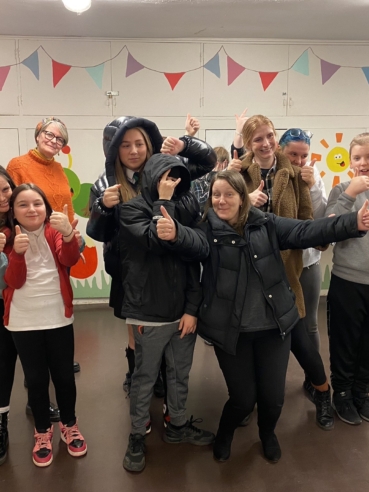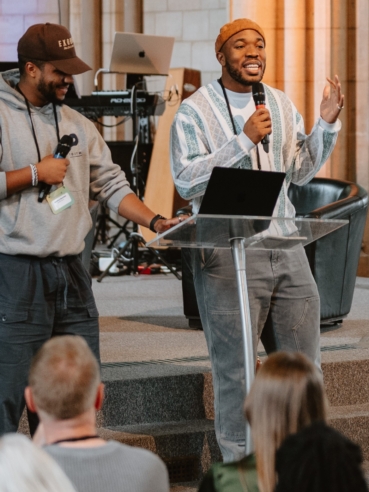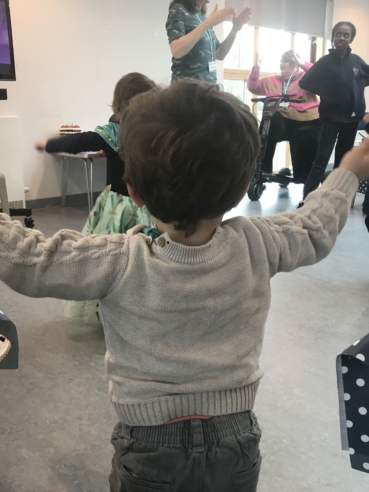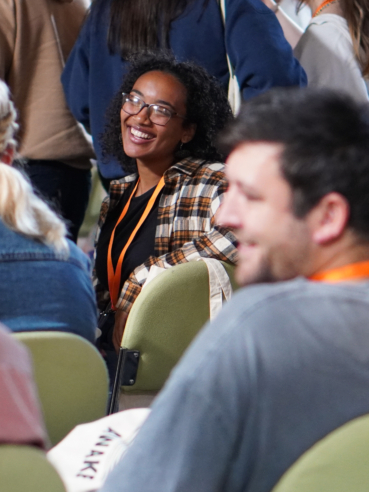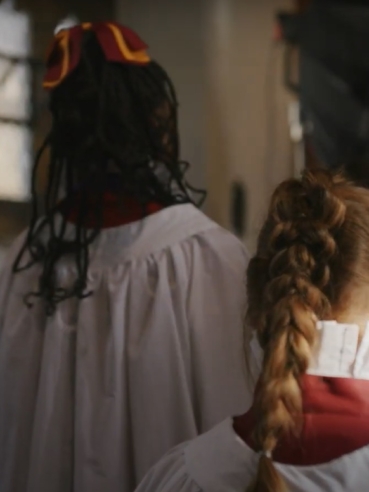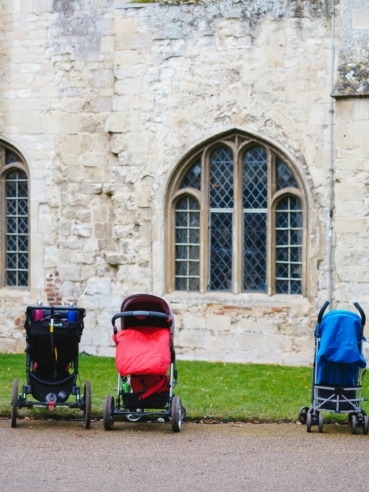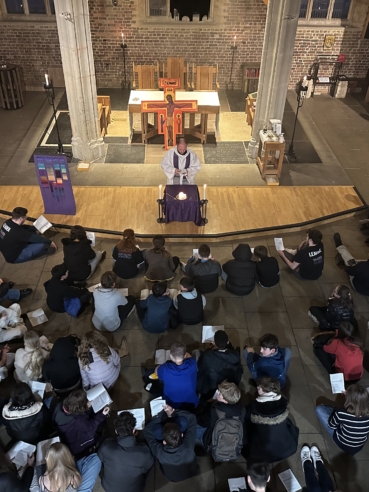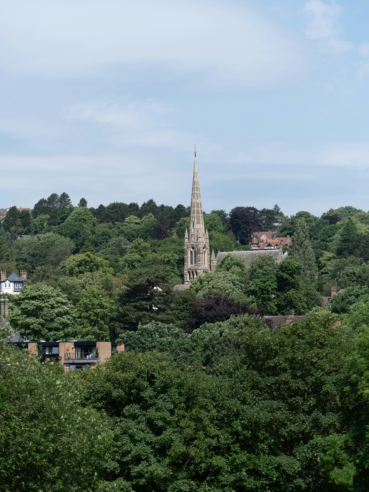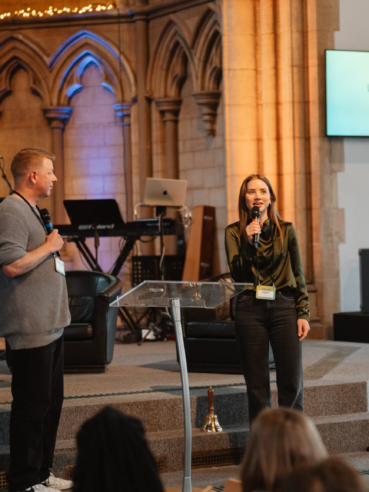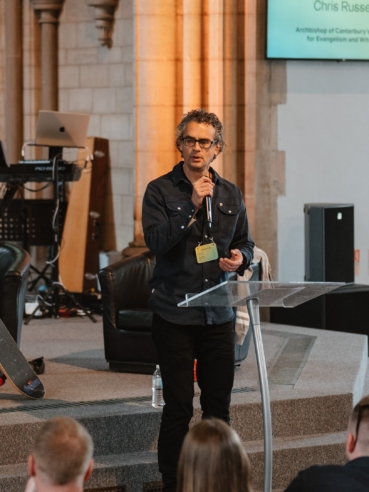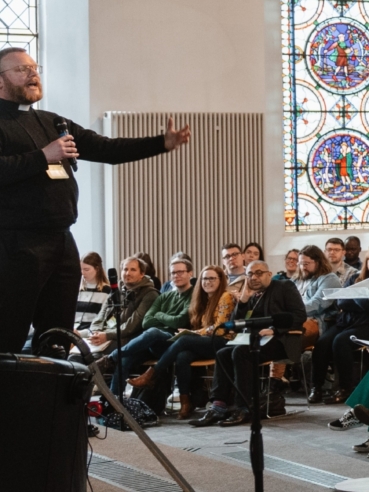There was a time when we were haemorrhaging young people around sixth form age – 16-to-18-year-olds. They weren’t showing up, despite being involved in our youth ministry for a number of years.
It made us recognise what a critical age this is – if we can inspire these guys at this stage to play their part in the youth ministry, we might enable them to see a greater vision, to be mobilised in a new way and inspired to play a part in the wider church.
I think that age group is the ‘Involve me, invite me, include me’ generation. They want to roll up their sleeves, get involved, put some skin in the game. They wanted to do church together, with people, they don’t want church to be done ‘at’ them.
We prayed and reflected on this, and what emerged was this idea that we call Young Guns. Essentially, the dream being that we could take young people on a journey.
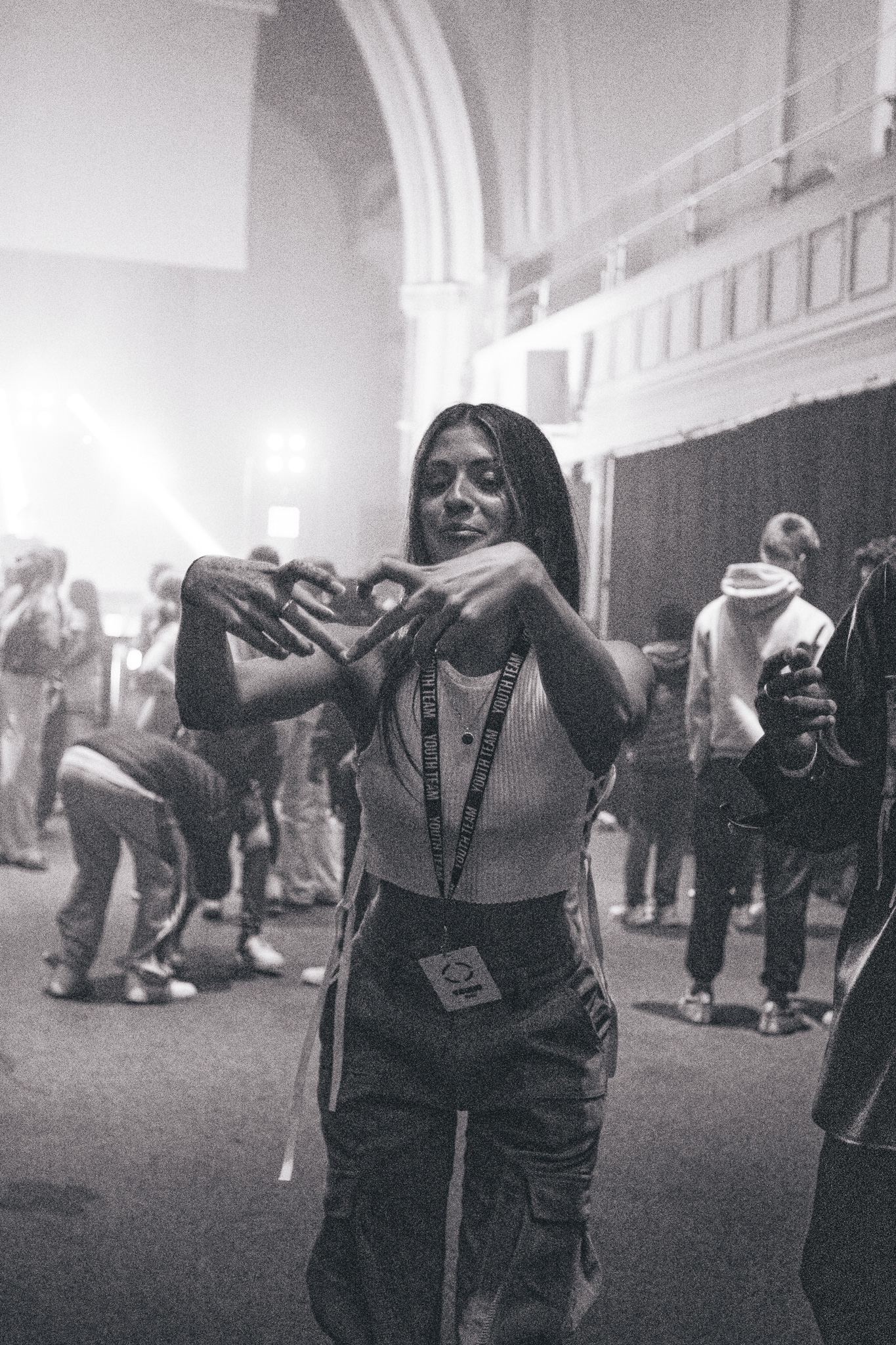 Young Guns basically starts as a rota, it’s nothing smarter than that: a young person begins looking after the worship words, or they’re on the rota for the kids team or younger youth, or for the band.
Young Guns basically starts as a rota, it’s nothing smarter than that: a young person begins looking after the worship words, or they’re on the rota for the kids team or younger youth, or for the band.
Over time, this practice of commitment to something forms into a discipleship journey. It’s full of small, simple steps. We’ll give them a lanyard that says Young Guns on it, they’ll come earlier to the sessions to help us set up, over time they become part of the team.
I would see the sixth formers as really running youth ministry with us. And that hugely forms their ideas of invitational culture – that involvement inspires them to bring their friends along, and get them involved. Ultimately, this group holds the next church planters, youth pastors, kids pastors, worship pastors, teachers, lawyers, the whole cross section. We could have some influence in what that looks like as they grow, so helping them get involved as leaders at this early stage makes a massive difference. Rather than leaving, they’re leading.
The dream structure we have is that every young person in our youth group is in a POD (PODs are Pockets of Disciples), consisting of one or two leaders reading the Bible with a group of two or three young people, no less regularly than every three weeks. They meet in coffee shops, bubble tea rooms, cafés, anywhere really.
For some young people, you might have to go through a few stages to get into a POD. Say a sixth former turns up to our service, we would show them everything that’s going on and at the same time invite them onto a WhatsApp group for all the sixth formers who want to help be involved in something. We’ll ask them what they’re good at, what they can do. For example, ‘I actually quite like helping out with my mum who runs this nursery’ so we might say, ‘that’s great you could help out in the kids group if you want.’
From there we get them on the rota serving once a month – it’s probably one of our first invitations. We get them together twice a year, for a Christmas party and summer party. We’ll go through, ‘What does it mean to be a Young Gun?’ and they’ll shape the role, the dos and don’ts, what it is and what it isn’t.
Crucially, it’s a very early invite to take part in this. We’re looking to spot that moment where they move from year 10 and year 11, being fairly committed to church or coming because their parents are bringing them along, to that sixth form transition where they can basically make choices themselves. Before they start taking those first decisions around whether they’ll still want to come to church, as they start to gain their own autonomy, we’ll invite them to come and be a Young Gun. You need to have the invitation cued up in and around that moment.
Those transition years are fundamental – moving from year six to year seven, year nine into key stage four and from year 11 into sixth form. We always look to offer the invite earlier: asking the year sixes to up into Youth earlier, asking our Youth of year nine into our Older Youth, asking year 11s into our Young Guns.
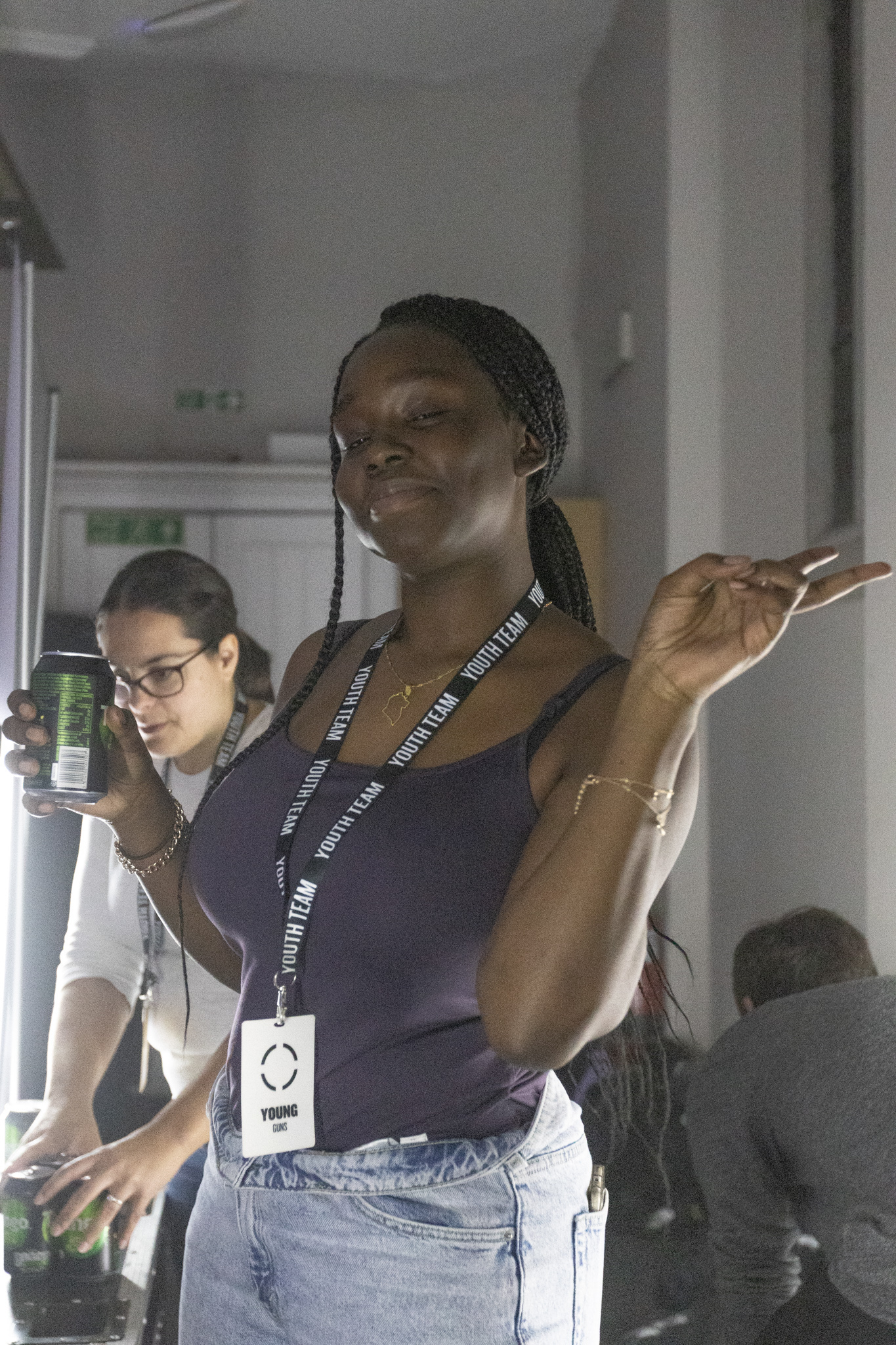 Our aim is that before our youth are having to make decisions about everything else in life, we begin the transition into the next group stage earlier. So while they’re deciding if they’ll go to sixth form – which one will they join, what will they study, what will they do after – they’re not having to factor in ‘Am I going to go to youth on a Wednesday?’ – we’ve already pre-empted that decision up to a year before. We’d rather that not be the last decision they make but the first.
Our aim is that before our youth are having to make decisions about everything else in life, we begin the transition into the next group stage earlier. So while they’re deciding if they’ll go to sixth form – which one will they join, what will they study, what will they do after – they’re not having to factor in ‘Am I going to go to youth on a Wednesday?’ – we’ve already pre-empted that decision up to a year before. We’d rather that not be the last decision they make but the first.
There’s risk involved in taking sixth formers on as a part of your leadership team. But I would say that the disciples were a total risk for Jesus. On that basis, I think it’s worth involving your 16, 17, and 18-year-olds in the structure and decision-making processes of your church.
If there’s one young person in your church, get them involved in the speaking or doing the words on the Sunday or playing in the band, or helping print the service sheets. Let’s just imagine they tell their friend, they’re doing that at school the next day and the friends says, ‘Oh that sounds really interesting, can I come along?’, you’ve double the numbers of young people in your church overnight.
The earlier we can get them involved, the better.
Of course there is risk. Faith is spelled RISK. There is risk involved, but I’d rather it be messy, and be full of Jesus, and be full of young people, than be void of teenagers.
One of the risks of that is, their behaviour doesn’t always match the level in which you’re modelling for them in leadership, and that’s difficult. We’ve got to manage that, but we would rarely take the lanyard of a young leader from them. Once they’ve got a Young Gun lanyard, ideally, they keep the lanyard. That’s a hard one to manage sometimes when you’re let down by decisions your youth might make. But at its best, we’ve seen Young Guns over the years basically bring their whole year group through church, journeying from Youth Alpha through weekends away to become members of our staff team now. It’s thanks to the fact that a Young Gun brought their friend along to church eight years ago.
If you want to find out more about our Young Guns structure, you can contact me at tom@htb.org
This article was printed in Multiply 2024: The Manual, a publication that accompanied the programme of Multiply 2024, which explored multiplying a younger church. You can find related content below.

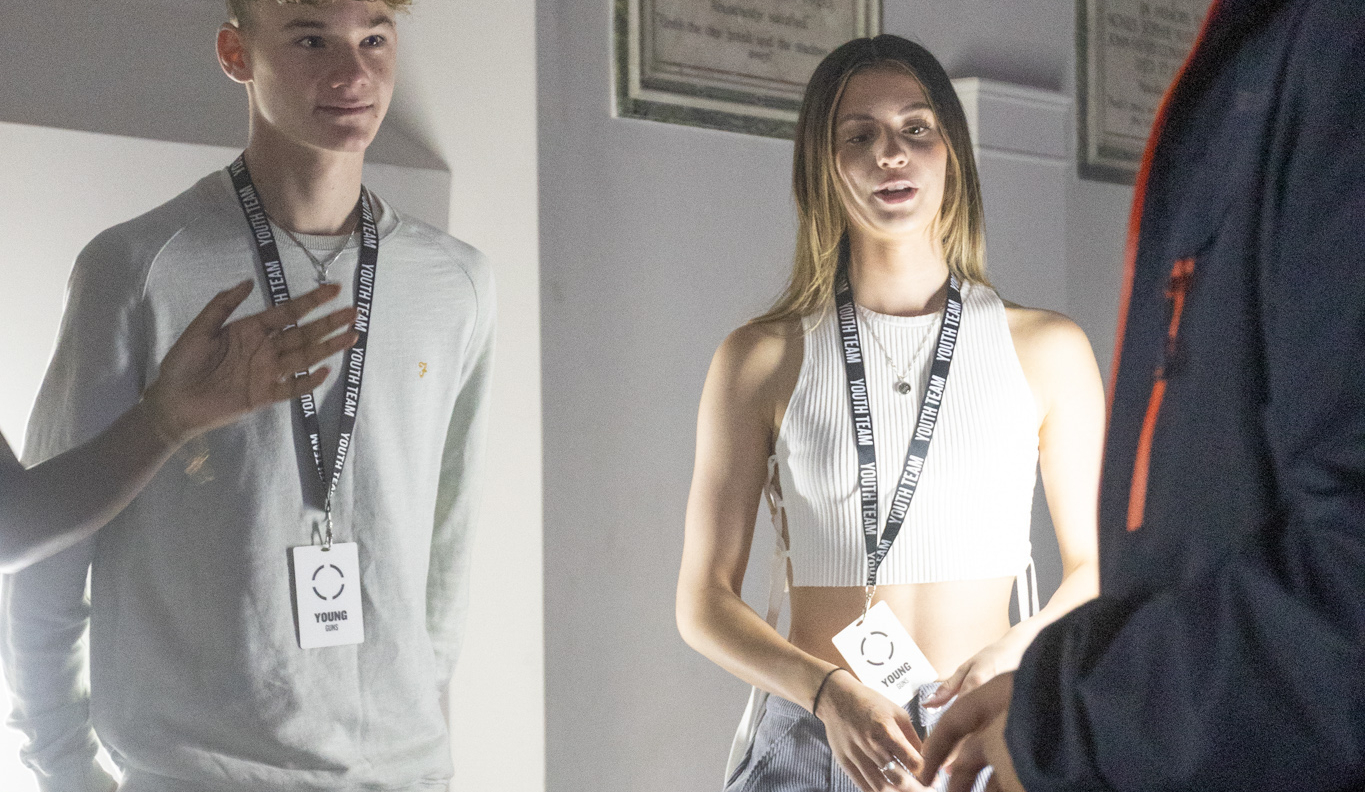
 Young Guns basically starts as a rota, it’s nothing smarter than that: a young person begins looking after the worship words, or they’re on the rota for the kids team or younger youth, or for the band.
Young Guns basically starts as a rota, it’s nothing smarter than that: a young person begins looking after the worship words, or they’re on the rota for the kids team or younger youth, or for the band.  Our aim is that before our youth are having to make decisions about everything else in life, we begin the transition into the next group stage earlier. So while they’re deciding if they’ll go to sixth form – which one will they join, what will they study, what will they do after – they’re not having to factor in ‘Am I going to go to youth on a Wednesday?’ – we’ve already pre-empted that decision up to a year before. We’d rather that not be the last decision they make but the first.
Our aim is that before our youth are having to make decisions about everything else in life, we begin the transition into the next group stage earlier. So while they’re deciding if they’ll go to sixth form – which one will they join, what will they study, what will they do after – they’re not having to factor in ‘Am I going to go to youth on a Wednesday?’ – we’ve already pre-empted that decision up to a year before. We’d rather that not be the last decision they make but the first. 